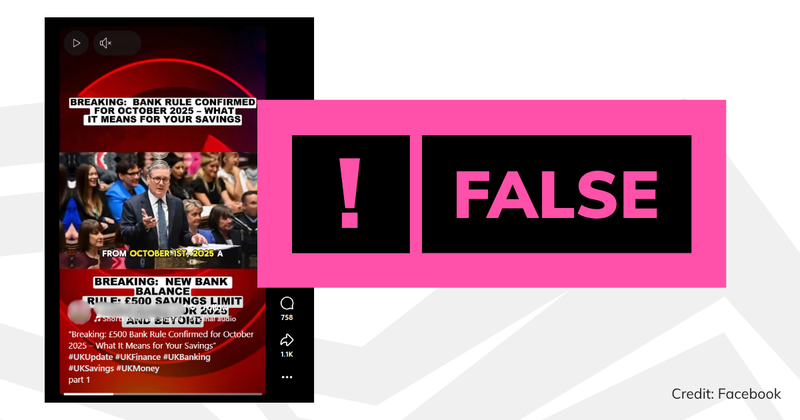A video shared thousands of times online claims that from October anyone who holds more than £500 in their bank account will be placed onto a government monitoring register.
But this isn’t true. A spokesperson for HMRC told us: “These claims are completely false and designed to cause undue alarm and fear.”
The clip, which is gaining traction on Facebook and TikTok, includes a voiceover, which appears to be mimicking a news broadcast. It says that Prime Minister Sir Keir Starmer has confirmed that from 1 October “a new financial control scheme approved by HM Treasury” will place anyone holding savings above £500 onto a “national monitoring register”.
The video goes on to say that this is to “reduce system misuse and balance the growing deficit”, and will give HMRC, the Home Office and Department for Work and Pensions “real-time access to your bank details through fresh data sharing deals with UK banks”.
A longer version of the video also claims that if people are receiving Universal Credit, Job Seekers Allowance or a student grant, and have a balance which “goes above that threshold”, their account could be paused for up to 30 days while “checks are carried out” and “unusual movement of money will need to be explained in detail”, including “every deposit”.
This content forms part of a recent trend involving videos, often originating on TikTok, that make alarmist and false claims about the government’s changes to finance rules and limits on personal freedoms. A Full Fact investigation found such videos have been shared hundreds of thousands of times.
This video also claims the change has been reported by BBC News. But we could find no articles by the BBC reporting the kind of change to personal banking that the video describes.
We have also contacted the Home Office and Department for Work and Pensions about the claim, and will update this article if we receive a response.
Before sharing videos such as this that you see online, first consider whether they come from a trustworthy and verifiable source. You can find guides and tips in our Full Fact toolkit to help you navigate information online.
